Managing Perfectionism in Medicine: Strategies for Student Well-Being
Part of the BRIDGE to Better student well-being webinar series, this session hosted by third-year medical students Molly Stegman and Blaise O'Malley highlights the impact of perfectionism on well-being, especially for medical students. The panelists will explore practical strategies to overcome perfectionism in medicine, including actionable self-compassion techniques and tools like SWOT analysis and SMART goals to prioritize personal health.
Watch the webinar recording or read the full transcript below to learn how to reduce stress, build resilience, and foster a balanced approach to medical training.
And be sure to check out the other webinar in this series, Substance-Free Strategies for Healthy Stress Management.
Table of Contents
- Introduction
- Defining Perfectionism
- Perfectionism in Medical School
- Consequences of Perfectionism
- Practicing Self-Compassion
- Strategies for Self-Compassion
- Personal Reflections and Affirmations
- Comparing to Others
- Embracing Mistakes
- SWOT Analysis
- Setting SMART Goals
- Personal Health Improvement Plan
- Closing Reflections
The Panelists

Blaise O'Malley, MPH,
Sidney Kimmel Medical College

Molly Stegman,
Pennsylvania State
College of Medicine
Introduction
Hi, everyone. Thank you for joining and welcome to Managing Perfectionism in Medicine. This session is part of our Bridge to Better well-being program for medical students. The speakers today: my name's Molly. I'm a third-year medical student at Penn State College of Medicine.
Hi, my name is Blaise. I'm also a third-year medical student, and I'm at Sidney Kimmel Medical College in Philadelphia.
We have nothing to disclose for this session. And we'd like to share that our funding is coming from the HRSA grant. We'd like to thank our partners, our AAFP affiliates who have helped contribute to this, as well as all of the participating medical schools who have medical students contributing to this curriculum. Just some ground rules for today are going to be to show respectful interactions with each other when sharing in the chat and to show support for each other as we share our stories. Our learning objectives for today are going to be to:
- Describe the impact of perfectionism on personal well-being
- Apply skills to practice self-compassion
- Assess strengths, weaknesses, opportunities and threats in the context of personal well-being
- Prioritize well-being by designing a personal health improvement plan
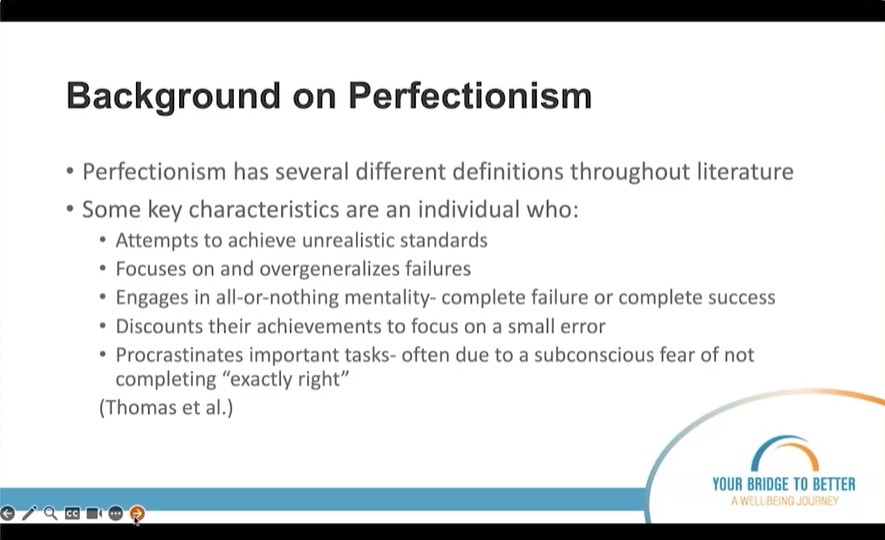
Defining Perfectionism
To start out, we want to ask everyone to take a minute to think to themselves what perfectionism means to them. This can either be what you think the definition of perfectionism is or how you notice perfectionism in your life, or just a few words of what perfectionism is. And you can just take some time to think about that to yourself.
I can share that, for me, perfectionism just looks like focusing on my mistakes mostly, and sometimes not being able to see the bigger picture, but just getting really fixated on the things that I could do better. And as we think about what the definition is for perfectionism for us, just some background in general. Perfectionism has several different definitions throughout literature, but some key characteristics that are shared among them are that people who are perfectionists are generally individuals who attempt to achieve unrealistic standards to focus on and overgeneralize failures, to engage an all-or-nothing mentality, meaning they look at things as a complete failure or a complete success, but usually not in between. They discount their achievements to focus on one small error, and they procrastinate important tasks. And this is often due to a subconscious fear of not completing things exactly right.
Perfectionism in Medical School
To speak a little bit more specifically about medical school. It has been established that perfectionism is very common among high achieving individuals, which makes sense, and it's prevalent in medical students.
There are three different types of perfectionism. One is called self-oriented. And so that means that you have unrealistically high standards towards yourself. One is other-oriented, and that means that you expect others to have unrealistic standards, and then one is socially prescribed. And so that is when you believe that one is being held to extremely high standards by society. And medical students tend to be self-oriented. So it's usually ourselves to think that we should be performing on a certain level and are holding ourselves to these standards, but we can fall into any of these categories.
Consequences of Perfectionism
Perfectionionist tendencies definitely help us in some ways, and oftentimes are what have gotten us to medical school. These tendencies help hold ourselves to high standards and work diligently on tasks. But the consequences of that is that perfectionism is impossible to achieve just by definition. So perfectionism can have a negative impact on medical student well-being just because it would be impossible to do that. And perfectionism is linked with high rates of burnout and anxiety. To safeguard our well-being, we need to learn to balance these perfectionist and really driven tendencies with practicing self-compassion so that we stay motivated but aren't putting ourselves in an unhealthy space that we're burning out.
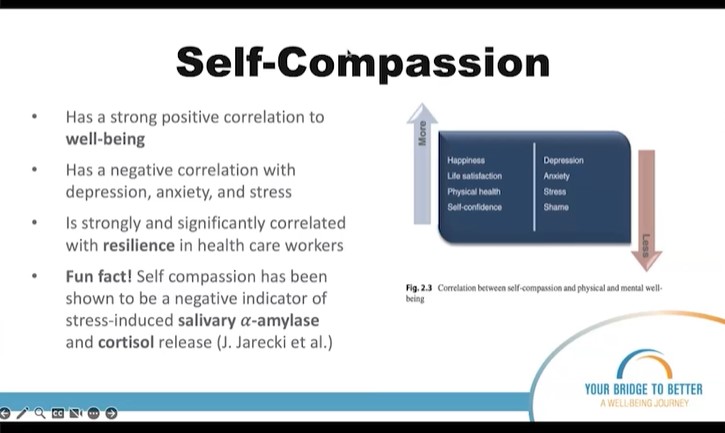
Practicing Self-Compassion
When we think about self-compassion and how we can practice that, we think about instead of judgment, practicing self-kindness, instead of isolating ourselves and putting a lot of blame on just ourselves and feeling very alone in that, recognize our common humanity and instead of over-identification, practicing mindfulness. So how do we do this? That all sounds great in theory, but that can be really hard in practice, as I'm sure we all know.
Self-compassion has a strong, positive correlation to well-being. The more compassionate you are to yourself, the more understanding you are of yourself and treating yourself with care and kindness, the more likely you are to be treating yourself well. It also has negative correlation with depression, anxiety and stress. So the more self-compassionate you are, the less likely you are to struggle with some of these mental health issues. It's also strongly and significantly correlated with resilience, specifically in health care workers. This means that the more self-compassionate you are, the more likely you are to be resilient. And that's probably not surprising to us. If you make a mistake and you're super hard on yourself, moving forward you're going to be very fearful about making that mistake again. You're probably going to be very stressed out about it. But if you're kind to yourself, you recognize your mistakes and then you learn from them and move on, you're a lot more likely to bounce back from that experience and then have positive experiences moving forward.
And then just a fun science fact. Self-compassion has been shown to be a negative indicator of stress-induced salivary alpha amylase and cortisol release. So more self-compassion, less stress-related cortisol running through you.
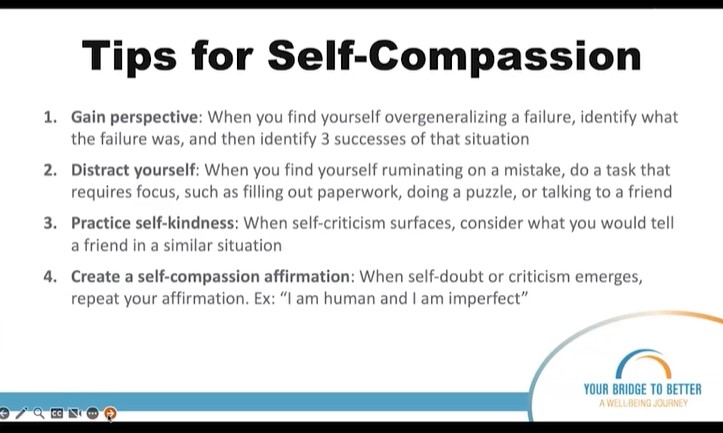
Strategies for Self-Compassion
In terms of how to actually practice this, we have some strategies here that we're going to talk about a little bit further, and we encourage you to think about how you can practice these yourself. The first one is to gain perspective. When you find yourself overgeneralizing a failure, instead of just harping on that and dwelling on the fact that things didn't go as you wanted to or you made a big mistake, identify what the failure was and then identify three successes of that situation. This helps give you a much more balanced view and even tips it into optimism and positivity. It helps you gain perspective on the overall situation and can really show you that, you know, beating yourself up about something is not going to help. And there's a lot of successes to celebrate as well.
Another strategy is to distract yourself. When you find yourself ruminating on a mistake, do a task that requires your focus. So this could be, you know, filling out paperwork that you have to do, doing your Anki, chatting with a friend. Just something not related to whatever the mistake or failure was. This helps you not get your mind stuck in this spiral that you can't get out of.
Another tip or strategy is to practice self-kindness, and specifically when this self-criticism starts to surface, consider what you would tell a friend in a similar situation. I think this is a super helpful practice because I think a lot of people try to do this and once they do it, they realize they're talking to themselves in a pretty harsh way and they would never talk to someone they care about in that way. So that also really helps gain perspective.
And another tip for self-compassion is to create an affirmation. I know that affirmations are really popular. A lot of people like using them for a lot of different things. If you're not familiar with what this is, it's basically a positive statement that you can kind of like repeat to yourself that's kind of short and sweet and helps you focus on the positive. For example, your affirmation could be, "I am human, and I am imperfect." Or it could be something as simple as, "You got this." And then when you keep saying that to yourself, you might start to believe it, and you'll definitely help yourself practice more self-compassion.
So let's practice. I want everyone here to take a moment to think about an example of how they can practice self-compassion in their life using one of the strategies we just talked about. As a reminder, that's gaining perspective, distracting yourself, practicing self-kindness through asking how you would react if a friend was in the situation and then the affirmation. Think about how this applies to your life. And then feel free to put it in the chat. While people think of examples, Molly, do you have an example of a strategy that you either like to use or did use recently?
Personal Reflections and Affirmations
Yeah. So I took a CBSE today, which I don't know if everyone knows what that is, but it's like my school makes us take a practice Step One before dedicated, which is starting soon. And so I was just feeling anxious about how it went. And I just was thinking for one of the affirmations, I would tell myself whatever I got on it, I'll just study hard and go from there. And I think that helps for within the perfectionism, I would get kind of caught up on things that I didn't know on the exam. And so kind of just to pull me out from thinking about each individual question and just thinking whatever happened, it's my starting place and then I still have dedicated so just reassuring myself through that. And I feel like when I make that affirmations more specific like that rather than just saying something general, it's more helpful for me.
Yeah. And I think that's also a great example of how the affirmations kind of dip into this other strategy of distracting yourself. It kind of pulls you away from the negativity that you might be thinking about and helps you focus on a statement that's true and also positive. So someone put in the chat, their self-affirmation is, "I make amazing contributions with my work," which I think is so lovely, right? Like, think about all the work that we do as medical students, all the good things that we do just as human beings that really contribute to society, help other people out, whether it's family members, friends, patients -- that can be really powerful. So that's great.
Comparing to Others
The next thing that we want to talk about is how comparison can be the thief of joy. One of the things that can contribute to this perfectionistic attitude is comparing ourselves to other people, specifically comparing ourselves to other medical students. When we frequently compare ourselves to other people in our cohort, other people in our class, this can obviously contribute to feelings of low self-esteem and anxiety.
All medical students are working hard. There's so many high achievers, and it can be really easy to look at what somebody else is doing and think, "Why am I not doing that? They're doing it so much better than I am." And in many cases, sometimes we're almost encouraged to compare ourselves.
For example, if there's some kind of ranking system, certain honor societies that you have to get a certain grade to get in or be a certain class rank to get in. It can be really hard because this definitely has a large impact on our well-being. So medical students might feel that they're not as good or as impressive enough as their peers. And this can inevitably lead to us worrying if they're doing enough, if we're good enough, if we need to be doing more than we're already doing, when we already might feel spread pretty thin.
Embracing Mistakes
One of the things that we recently added to this webinar that I think hopefully humanizes other medical students and hopefully makes everybody here feel a bit better are real mistakes that medical students have made. And I laugh when I see this slide because it says medical students, but it's actually not plural. It's just me. I'm the medical student. I had asked so many other medical students to share their mistakes, explaining, "I'm doing this webinar on perfectionism. Do you have mistakes I can share to, you know, humanize us all? Show everyone that we all make mistakes. Nobody's perfect all the time." And I think those perfectionist tendencies kick in, right? And people are like, "no, I don't want to share my mistakes." Even though we make them.
I think that just goes to show how pervasive this perfectionist attitude is, but I do want to share with these out loud with you all, because I think they very much show how medical students are not perfect. We don't have it all figured out. And I also think they're really funny. When I was a second-year med student, I pointed to a patient's spleen in the O.R. and asked the surgeon if it was a kidney. I gave an OB patient who was going into labor, an icepack that's made for the perineal area, essentially for for vaginal pain. I gave it to her for her face when she asked for an ice pack to cool her forehead down. I told the patient that we were using the big speculum on her. Did not mean to do that. And then when I was pre-rounding on a surgical patient, I forgot to check the surgical site.
Hopefully this shows that, you know, we all make mistakes, or at least I do. There's tons of silly mistakes that we can beat ourselves up about, but in my opinion, it's way easier to laugh at them.
Somebody shared: I asked an OB resident to explain what she had said, and she told me to Google it. Yeah, it happens, right? I feel like so many of us have had such a similar experience, or we're trying to show that we're engaged and active in our learning, and they're just like, "Google it. Don't ask me." I definitely feel you on that one.
Somebody else put one in: Asking a deaf patient using an ASL interpreter if he had any changes to his hearing recently. Oh, that's a great one! That is a great one. Yeah. I'm glad that you guys laughed it off. I do things like that all the time.
This made me think of another example, actually. I was just in -- I'm on my family medicine rotation right now -- and I was just in clinic the other day, and I was telling the attending about this patient I was presenting on and I said, "You know, the patient isn't on a contraceptive, but she's sexually active, and she doesn't want children. I don't know what to do." And the attending looked at me and was like, "This woman has had a tubal ligation. She's going to be fine." And I was so embarrassed because it was hidden in her chart. It wasn't in the place where the surgical history is normally listed, but I hadn't asked about it, and I felt like such a fool. But I feel like it's just a classic med school mistake.
I feel like everyone has stories like this. Once people start sharing, I think it's just hard to be the initial sharer, right? Nobody wants to admit that they make mistakes. I think that's part of the perfectionist attitude and personality traits as well. But then I think that there's a lot of shared experiences once we do realize that everybody's going through it, and we all make embarrassing mistakes and it's okay.
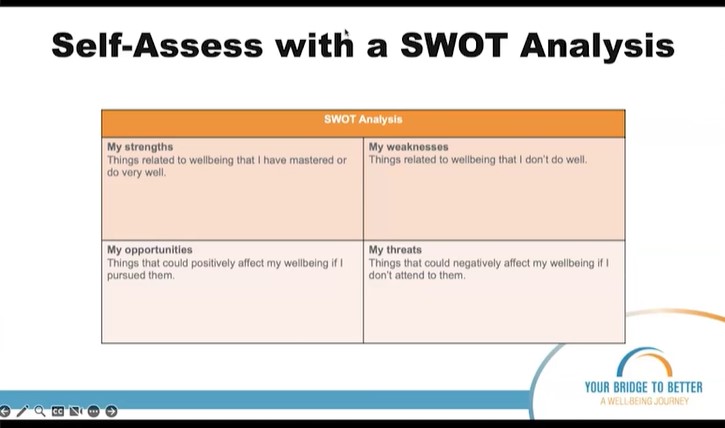
SWOT Analysis
The next exercise is called a SWOT analysis. You may have heard of this in a different context. For example, sometimes you'll do them in a business class, for example. But it's a form of assessment that stands for strengths, weaknesses, opportunities and threats. What we want to do tonight is a self-assessment using the SWOT analysis tool.
You can think about this as it relates to self-compassion. You can use it as it relates to anything related to perfectionism and improving your wellness in medical school. And we can go through specific examples if that's helpful. But what we want to do is first, think about our strengths. For example, you could think about what are your strengths related to self-compassion? And you can say, "Okay, well, I'm really good at taking breaks when I need them. Maybe I'm really good at not procrastinating. I get things done."
Then you want to think about your weaknesses. So things related to well-being or compassion that you don't do as well. For example, maybe I really dwell on negative things, and I waste a lot of time thinking these pessimistic thoughts.
Next is opportunities. So these are things that could positively affect your well-being or your self-compassion skills if you worked on them. So, for example, let's see, maybe you could say, you know, "I have this like affirmation app in my phone that I've never used, but it's free and it's there, and it says nice things to me if I just plug it in." That's an opportunity to get some more positivity in your day and give yourself some more self-compassion in a really easy and quick way.
And finally threats. These are things that can negatively affect your well-being if you don't attend to them. For example, maybe you're on a really busy rotation right now, and you just don't have a lot of time. And so time management could be a threat, like, "I don't have the best time management skills, and if I don't figure that out soon, I'm probably going to struggle being self-compassionate and ensuring that I'm taking care of my well-being."
So that's just a very basic general overview of how you can do a SWOT analysis as a self-assessment in this case in the context of self-compassion. Let's take a few minutes right now, and I really encourage you to write this out on a sheet of paper or at least say it out loud, just something where you're committing to it. Because I think when you actually write it out or you say it out loud, and you see everything kind of out in front of you, it becomes very clear what you need to work on, but also what you're already excelling at, which can be very reassuring. So let's take a few minutes now to work on this. And I'll do it, too.
Somebody said a strength they have is being reliable. Weakness is procrastinating on boring projects. Opportunity is studying Anki cards, and threats would be mediocre time management skills. So this is great, right? Like it identifies something that you're really good at -- you're a reliable person, and that goes a really long way in medicine and in life. Weaknesses, though, things that you're maybe not as interested in or as engaged with, you can procrastinate. So you can think about, "Now that I know that it's a weakness, how can I improve on that? What are ways that I can get better at addressing projects that I don't find as interesting?" And an opportunity: "Studying my Anki cards." Maybe you have Anki cards already made, it's just a matter of getting to them. Maybe you use some premade decks, but whatever it is, the opportunity is there to really gain some more knowledge and improve your memorization. And then threats. Maybe your time management skills aren't as strong. And while that might be okay in the present moment, you can see how that might threaten you in the future in terms of your well-being. Because as we know, more time management can lead to more stress and ultimately burnout.
I can share mine. For my strength recently, I think that I go to the gym on a schedule, so it's been nice to be able to stay consistent with that. And grocery shopping on a schedule, too. So I've been able to have a pretty healthy diet. And then also just spending time with my friends. Weaknesses: I think that throughout the day I usually feel pretty guilty planning to take breaks. And so I'll plan in my head that I'm just going to work from the time I get out of class until I go to bed, which is unrealistic. So then I end up on my phone for so much time of that that I really should just be like taking actually restful breaks. So that's a huge weakness right now. An opportunity is that the gym on campus, I just found out, has these free yoga classes, so I went to one. I think that if I could go to that once a week, it would be really helpful just to take time to like get away from school and just be calm for a little bit. And then threat is going into step one studying. I know where all of my friends were last year and like how long it took them and what scores they were getting at what point. And so I think it is going to be really, really hard to not compare myself to that and not be hard on myself when I'm not like living up to what other people did.
Yeah. Thanks for sharing. I feel like that was a really honest and realistic self assessment. And hopefully by, you know, writing it down and saying it out loud, it kind of gives you ideas about okay, how can I enhance my strengths and how can I work on my weaknesses? Yeah, I think it's always hard when there's something big looming, whether it's a board exam, like step one or an OSCE or whatever it may be. You know, I think our wellbeing can very easily be affected in those situations. And so I think it's really awesome that you were able to identify a lot of strengths that will hopefully help you in that situation.
Yeah, definitely. Thank you. And I think that identifying it before those things start is helpful. So I'm glad that we did this just so that I can think about it before I get into the thick of it.
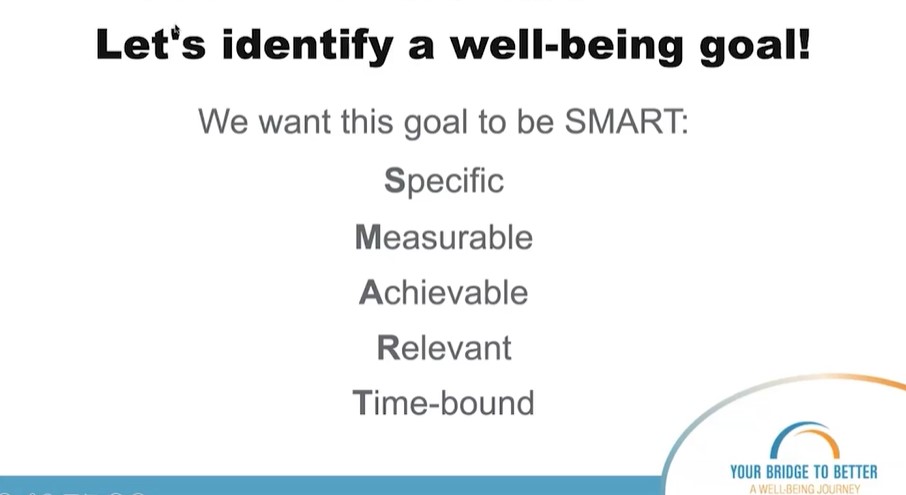
Setting SMART Goals
Next, now that we have kind of our strengths, weaknesses, opportunities and threats laid out for us, this helps us make goals. Think about things that we want to do and how to maybe do them differently or keep doing them in a way that's going to help our well being. And so a good way to frame goals is by using what's called SMART goals. SMART is an acronym for specific, measurable, achievable, relevant and time-bound.
I'll give you an example, and hopefully it'll highlight why it's actually quite effective. For example, instead of saying that, "I want to study better," or, "I want to study more." Instead, you could say, "Over the next week, I want to do 50 world questions." This is very specific, right? It's not just saying, "I want to study." It's saying a specific resource that you want to use with a specific number of questions that you want to get done. It's measurable, right? I gave a specific number of the questions that I want to get done so I can see, "Am I 25% of the way there? Am I 50% of the way there?" You can measure it as you go. It's achievable. This is going to differ for everyone, but you can ask, "How realistic is it that I'm actually able to get X number of questions done through X resource," right? And you can adapt that to whatever suits your schedule best. It's relevant because it's a resource that I use to help study for my shelf exams. And it's time-bound, right? I said it's over the next week, so it makes for a very clear path to achieving your goal, which is really going to help you in terms of planning out what you want to get done.
SMART goals are great. I use them all the time. I encourage people to use them for New Year's resolutions as well, because I think those are goals that are particularly easy to forget about. I'm definitely guilty of that, so making a SMART goal can really help, and it helps you stay on track, especially because it has that measurable piece.
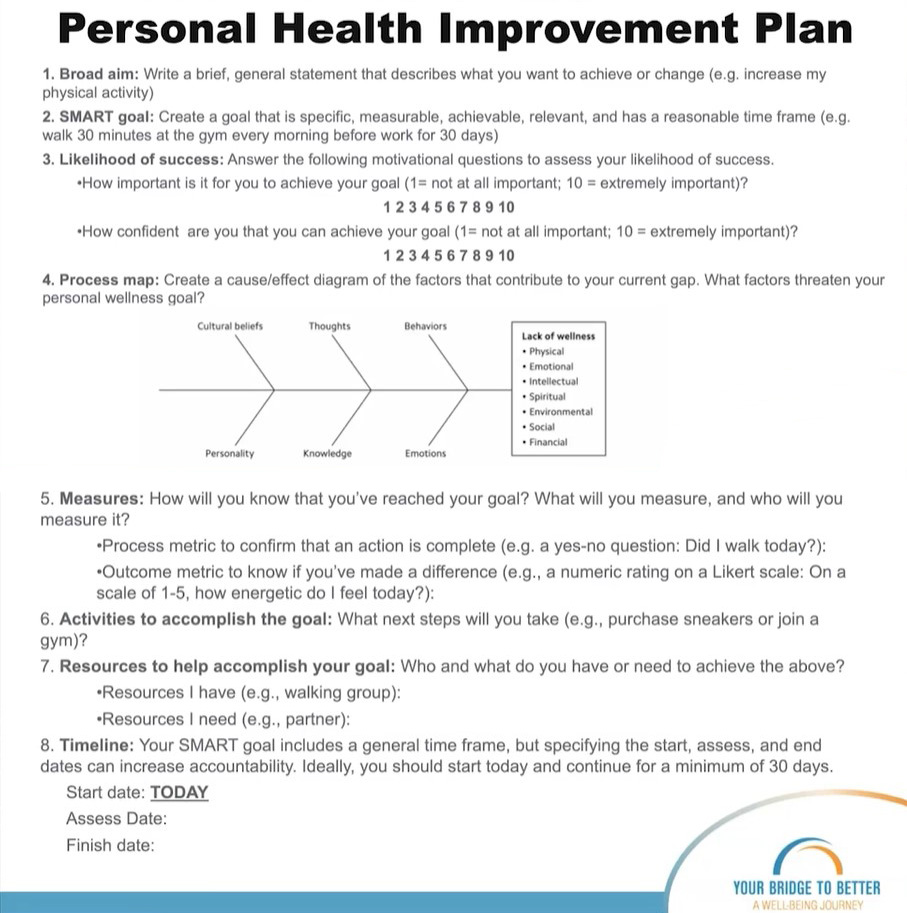
Personal Health Improvement Plan
This is the last activity for the night. This is called the Personal Health Improvement Plan. We won't go into too much detail because we're coming up on the hour, but it is a very cool and effective way to improve your health, and it makes use of SMART goals as well.
This slide breaks down how to make a personal health improvement plan. Take something in your health that matters to you, that you want to improve upon, and then go through the steps here so that you can help achieve that. You can help yourself achieve that goal.
Start with a broad aim. Write a brief general statement that describes what you want to achieve or change. For example, just say, "I want to improve my diet," or, "I want to exercise more." Start with that broad aim. Figure out what the theme is of your improvement plan. Then turn it into a SMART goal. So like I said in the example before, it's not just, "I want to study more," or, "I want to study better." It's going to be do this amount of questions in this amount of time.
Then, assess the likelihood of success. We want to make sure that these goals are actually going to be achievable, right? That's the "A" in SMART. We want to make sure that you're setting yourself up for success. And if it's too big a goal, then we can break it down into smaller, easier chunks.
Ask yourself, how important is it for you to achieve your goal and how confident are you that you can achieve your goal. And then if you feel that it's an important goal that you've identified, that you're fairly confident you can achieve, then put it all in front of you in a process map. This is a cause- and-effect diagram. Here is a fishbone diagram, but there are several examples of the same sort of thing listing all the factors that contribute to your current gap. So why is this something you need to improve on? What's going on here that makes it something that's been tricky for you in the past? And importantly, what factors threaten your personal wellness goal?
The next step is to think about the measurement. Again, this is a component of the SMART goal. How will you know that you've reached your goal? How are you going to measure that and confirm that the action is complete, that you've achieved whatever you wanted to achieve in order to meet the overall goal? Then think about activities to accomplish the goal.
I know this seems like a lot of steps, but that's very intentional. It's to make sure that you have a really thorough plan in place so that you can actually achieve what you want to achieve. That's why we asked, "Is this something important to me?" Because we want it to be something that's important to you that you're motivated to actually make change for. So think about the activities that will help you accomplish the goal.
Then, think about the resources you have that are going to help you get there. Who do you have that you have on your side that can help you out with this? For example, if your goal is to increase exercise maybe you have a walking group or running group that you can run or exercise with.
And then importantly, the last part of this SMART goal is the "T." Think about timeline. Specify the start, assess date and finish date with the assess date being when are you going to check in on your progress? It can be a good idea to kind of do that mid-way through the timeline that you have set. But it's also important to be flexible and to be assessing it throughout. Ideally, you should start today or whenever you have your personal health improvement plan set up. And then go for a minimum of 30 days, which I know sounds like a lot, but it can take a while to build a habit. That's why we want to do this long term.
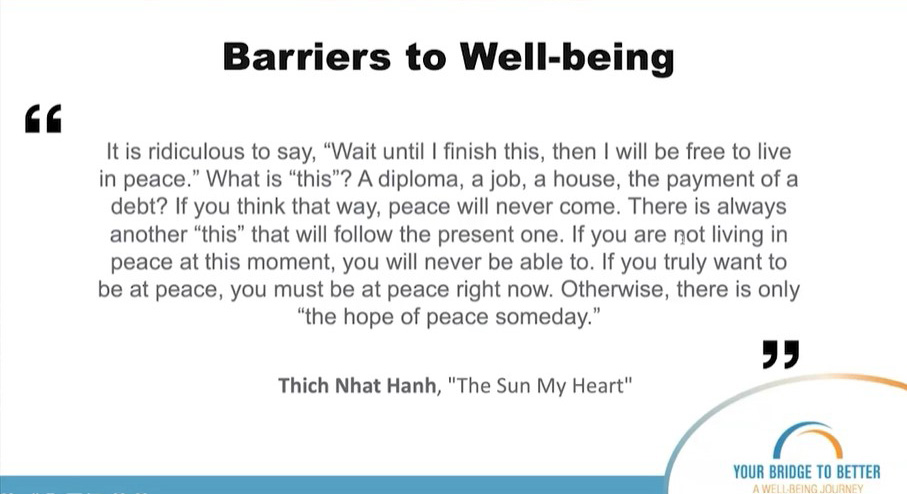
Closing Reflections
We wanted to end with a quote today before we get into the questions.
"It's ridiculous to say, "Wait until I finish this, then I will be free to live in peace." What is "this?" A diploma, a house, a job, the payment of debt? If you think that is the way peace will never come. There is always another "this" that will follow the present one. If you are not living in peace at this moment, you will never be able to. If you truly want to be at peace, you must be at peace right now. Otherwise, there is only "the hope of peace someday."
I think a good takeaway of this quote is that it's really easy to push off when we will take care of ourselves and when we'll feel that peace. I think if you don't feel at peace right now, it just means that you have some room to grow, but it doesn't mean that will never happen. I think that especially in my school, I hear my friends talk all the time where they'll say, "Once we match, then we'll feel calm." But then there's residency. And once we're attendings, but then we'll be stressed. And they kind of make jokes about like, "Well, we'll feel good in retirement," which makes me very sad. So I think it's so important that we find happiness at every stage of our training, because I think looking back, we're going to want to have enjoyed this time. So that's why I really like this quote.
And Anders, we can definitely talk about how do I make a boring project exciting? So I think that that's what you said for your weakness, right? Procrastinating on boring projects? This doesn't necessarily make it exciting for me, but when I have a boring project, I'll usually set a 30 minute timer like one night I'll set a 30 minute timer and say, "I'm going to see how much I can get done in 30 minutes." And I mean, it's a little exciting because I'm like seeing how much I can get done, but more so at the end of 30 minutes, which isn't too much time to commit, I at least started, and that makes me feel a lot better. But I will also say that sometimes if the project is not super difficult, if you work on it somewhere fun, or I'll have my friends over and watch "The Bachelorette" while I work on it. I think that sometimes making it a more fun environment that you're in can make the boring project better. But what does everyone else think? And if anyone else has weaknesses that they want to talk about, we can all work through them together.
Yeah. And I just want to add to your point, Molly. Sometimes you can't make a boring project exciting. Sometimes a boring task is just a boring task. And I think acknowledging that is totally fine and oftentimes helpful. I love the idea of, you know, maybe it's boring, but like, you invite your friends over, and so you're pairing it with something fun. Or sometimes I acknowledge it's boring, and then I'm like, "Yeah, this is boring." So I want to get it done as soon as possible. And it almost motivates me to just get it done and out of the way so that I'm not stuck with this boring thing that's just looming in the future. It's just off my checklist.
I was going to say that sometimes I'll, if there's something I know that, getting a coffee will motivate me or getting a pastry and then going to work helps. And then I saw that Cherylyn said, "I need to exercise in my day," but not being able to. And I think that it depends, Cherylyn, if it's a time issue or more like a motivation? Because I think sometimes, when it's time, if you're able to even get in like ten minute YouTube workouts or -- I actually did one today -- it was called "Ten Minute Brain Yoga" before my exam. But yeah, there's quick workouts that you can do. Or okay, this is kind of bad advice, but if you need do work, and you're like, "I'm going to listen to a podcast to study while I go on a walk," like, if you really don't have time, you can sometimes pair it. And then I think for motivation, it's about finding something that you enjoy exercising. When I say, "go to the gym," I'm rock climbing, which for me is very fun. So I think that's what motivates me to go. And then also if you can go with friends or schedule class that you're going to. Do other people have ways that they get exercise in?
I also have struggled with this in the past and definitely still do. Anders said, "I do it in the morning so it's done with," which I think is great. I'm personally really not a morning person, so that would be super hard for me. I think if it works for you, that's an awesome strategy. For me, one thing that works when I have very little motivation to work out is I think about the smallest possible task. So I'm like, "It's important that I work out, but I'm very tired. I don't feel like working out." So I think, "Okay, what's the smallest thing I can do?" I have some weights in my living room, so the smallest thing that I can think to do would be to lift or it would be to do one pushup. And I tell myself, "Doing one push up or moving the weight up once is fine. If you do that, that's better than doing nothing." But what I find often happens is that when I do one pushup, I'm like, "Okay, I'm not just going to do one pushup. I can do like five or 10 or 20. Or when I start going with one weight, then maybe I grab another one. Then I'm like, "No, I can do a little bit longer." And so I find it's often just the barrier of starting -- getting myself going. And so that's why I think it can be super helpful to just think about what the smallest possible task is that would still count as exercise or whatever your goal is, and then you can use that as motivation to keep going.
And I think especially for exercise, the SMART goal is really helpful because it's easy to build one around exercise. And I think the most important part of that is being realistic. So, you know, maybe not making the goal right off the bat to exercise every day. But even I know my friends were telling me that there is this study that came out that weekend warriors, so that's people who exercise only on the weekends and not during the week, have comparable outcomes (I haven't looked at it) to people who exercise during that week. And so I think that even if you're saying, "Sunday afternoons, I'm going to do a workout for one week," I mean for one month. And if you can accomplish that, build up from there. But maybe even just going for a walk on Sundays and then building it up. Start small, and we'll definitely start.
Well, thanks to everyone who shared. We're wrapping up here. Unless you guys have any further reflections or thoughts. We love when you guys participate and ask questions. Hopefully you found this useful. If you have any feedback for us, that would be fantastic. We really just want it to be helpful for you and your well-being. So thank you so much for coming out. We hope you enjoyed this.